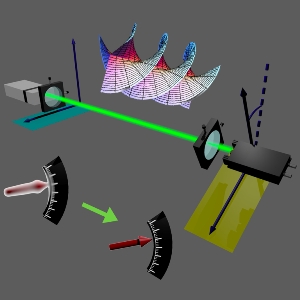Oct 4 2013
Novel optical devices that 'twist' and 'untwist' a beam of light enable a promising new measurement technique, researchers from Singapore, Italy and Spain have shown. The international team published its results 18 September in Nature Communications and has applied for a patent on the technology.
 The photonic polarization gear reported in Nature Communications makes ultra-sensitive angular measurements possible. (Image: Quantum optics group at Sapienza Universita di Roma)
The photonic polarization gear reported in Nature Communications makes ultra-sensitive angular measurements possible. (Image: Quantum optics group at Sapienza Universita di Roma)
Light becomes twisted when the orientation of the light wave's electric and magnetic field varies across the profile of the beam. The beam then spirals through space like a corkscrew and its photons acquire an 'orbital angular momentum' (OAM), separate to the spin associated with the light's polarisation.
Researchers around the world have been exploring possible applications for OAM light, from increasing the density of data transmission down optical fibres to building new types of sensor. The collaboration involving CQT Principal Investigator Kwek Leong Chuan and his former student Li Ying, now a postdoc at Oxford University in the UK, has shown how such light could increase the sensitivity of angular measurements over current state of the art almost 100-fold.
The trick relies on devices known as 'q-plates' designed and built by the Italian members of the team. These q-plates are patterned sheets of liquid crystal that act on the orbital angular momentum of light. Passing a circularly polarised beam through a q- plate adds twist, with the quantum 'm' of OAM acquired depending on the pattern in the plate. When the beam passes through the plate again, it is untwisted and the OAM is absorbed into the beam in a way that affects the phase of the light – the phase is multiplied by m. This is the 'polarizarion gear' effect that can be harnessed for measurement of angles. Because the phase change is multiplied by m, it becomes easier to detect.
In the work published in Nature Communications, the team report experiments for q-plates that can impart OAM up to 100. The researchers, supported by their respective Universities, have applied for a patent in Italy that covers this use of their q-plates.
"The technique is quantum-inspired in a historical sense," says Kwek, who was involved in the theoretical side of the work. It has long been known that entangled quantum particles could increase precision in measurement. The promise of quantum metrology is that the uncertainty of a measurement made with N entangled particles (eg, photons) would scale as 1/N rather than 1/√N, as is the case for measurements made the classical way with N unentangled particles.
Kwek and his colleagues started by thinking about using OAM light to reduce uncertainty further – with entangled OAM photons, the uncertainty would scale as 1/mN. They show this experimentally in the Nature Communications paper with entangled states of two photons. But the quantum route is challenging because entangled states of many photons are hard to make – so it's not efficient to make N big. Instead they note that a classical approach, which has uncertainty scaling as 1/(m√N), already offers big improvements in precision given they can use their q-plates to make m as large as 100. The measurement is also robust to photon losses, a problem which derails attempts to make measurements with entangled states.
The authors write in the paper that this classical approach is "immediately applicable to real world optical measurements".
For more details, see "Photonic polarization gears for ultra-sensitive angular measurements," Nature Communications doi: 10.1038/ncomms3432 (2013); arXiv:1306.1606.
The Italian patent pending application (RM2013A000318, deposited 3 June 2013) is titled 'Ultra-sensitive photonic tiltmeter utilizing the orbital angular momentum of the light, and relevant angular measurement method'.